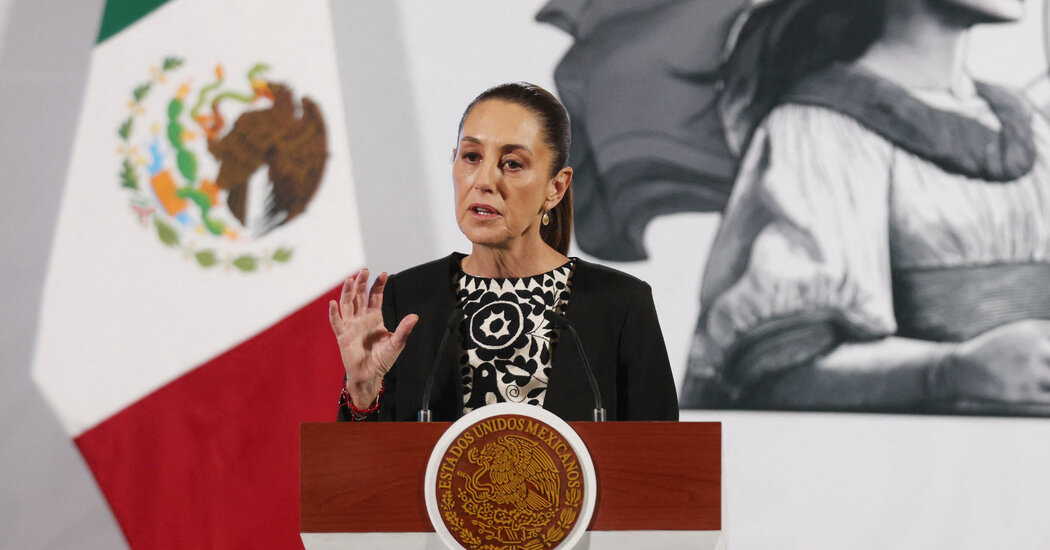After President Trump signed a blizzard of executive orders, many directed at her country, President Claudia Sheinbaum of Mexico put on a show of her own on Tuesday morning.
“It’s important to always keep a cool head,” she told reporters during a news conference.
Ms. Sheinbaum said that Mexico would support its nationals in the United States, calling them “heroes and heroines of the nation.” She said the country would act within the Mexican Constitution and laws. And she sent a message to those watching: “May they know that the president of the republic will always defend Mexico, above all else.”
Ms. Sheinbaum then displayed the five executive orders that Mr. Trump announced on Monday that directly involved Mexico, addressing each one.
“This already happened — it’s not something new,” Ms. Sheinbaum said, referring to Mr. Trump’s 2019 declaration of a national emergency to unlock federal funding to construct a border wall.
Back then, her predecessor, Andrés Manuel López Obrador, who managed to forge a warm relationship with the Trump administration, collaborated with the United States, Ms. Sheinbaum said. She hinted that she, too, was willing to cooperate.
At the time, Mr. López Obrador won Mr. Trump’s favor by allowing the United States to dictate major concessions on migration. Mexico bore the burden of housing and feeding tens of thousands of desperate migrants, straining resources in cities and towns.
According to human rights groups, many also became easy prey for criminal organizations who extorted, tortured, abducted, abused and killed them.
Reviving ‘Remain in Mexico’
Mr. Trump vowed to reinstate a policy known as “Remain in Mexico,” which, during his first presidency, forced migrants applying for asylum to wait in Mexico until their hearings in U.S. immigration court.
Back then, Mr. López Obrador agreed to take in migrants, who waited for months in border towns. Similarly, when the Trump administration instituted Title 42, a policy that allowed U.S. border agents to quickly expel asylum seekers, Mexico agreed to take them in.
This time, things might be different.
“If there is a person who is at the border, more so now that it’s so cold, obviously, we act in a humanitarian way,” Ms. Sheinbaum said on Tuesday. “We’re not going to leave people out in the open. And then we’d seek to repatriate them to their countries in case they are foreigners.”
Asked if that meant that non-Mexican nationals applying for asylum in the United States would not be allowed to wait in Mexico this time, Ms. Sheinbaum said: “When they arrive at the border, they are not going to be able to enter the United States. So it is much better for them to return to their country of origin.”
As to whether Mexico would pay for those deportation flights, Ms. Sheinbaum said her team would talk to the Trump administration about that.
Renaming the Gulf
In an attempt to honor what he called “American greatness,” Mr. Trump signed an executive order to rename the Gulf of Mexico the Gulf of America.
The issue has been mocked in Mexico, where this month Ms. Sheinbaum herself joked that the United States should be called “Mexican America.”
Mr. Trump’s order instructs the U.S. secretary of the interior to rename the continental shelf that includes the states of Texas, Louisiana, Mississippi, Alabama and Florida as the Gulf of America.
That’s fine, Ms. Sheinbaum said, adding, “For us and for the whole world, it is still the Gulf of Mexico.”
Labeling Cartels Terrorists
Mr. Trump said he would consider designating Mexican drug cartels as “foreign terrorist organizations” — a move that could have myriad consequences.
The designation could open the way for his administration to take military action against the cartels, including in Mexican territory. And it could create problems for multinational companies operating in Mexico, since any financial ties to cartels, such as extortion payments made under duress, could come under scrutiny.
“They are free to take action in their territory,” said Ms. Sheinbaum, adding that criminal groups also operated in the United States. “What we will defend is our sovereignty and our independence,” she said.
It’s a message she has repeatedly sent: Mexico is willing to coordinate with the United States but not to be subordinated to it. On Tuesday, Ms. Sheinbaum again highlighted the willingness of Marco Rubio, the new U.S. secretary of state, to collaborate on curbing cartel activities.
“He says, ‘We are going to seek coordination with Mexico,’ and that’s what we are going to look for, as well,” she said. “We all want to fight the drug cartels, that’s obvious. So, what do we have to do? Well, we have to coordinate efforts. We have to collaborate.”
Reviewing Trade Practices
Mr. Trump ordered federal agencies and officials to begin an investigation into trade practices — such as trade deficits and whatever they consider to be “unfair” trade — by Mexico and other countries.
The U.S. trade representative was also instructed to prepare for the review of the United States-Mexico-Canada Agreement, scheduled for July 2026. The agreement was signed in 2020 during Mr. Trump’s first presidency, and he called it a “colossal victory.”
U.S. officials are expected to assess any “unlawful migration and fentanyl flows” from Mexico and Canada, and recommend measures to resolve the “emergency” — a scenario that Ms. Sheinbaum said might not even happen.
“So it’s important,” she said, “to keep calm.”
Simon Romero contributed reporting.
Checkout latest world news below links :
World News || Latest News || U.S. News
The post After Trump’s Threats, Mexico’s Leader Says She’ll ‘Always Defend’ Her Country appeared first on WorldNewsEra.

